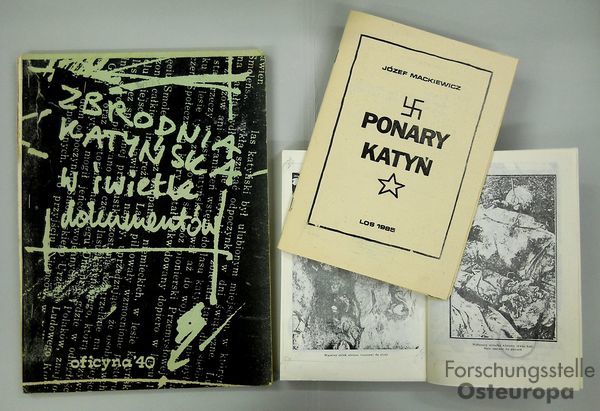Conference: Coming to the Surface or Going Underground? Art Practices, Actors, and Lifestyles in the Soviet Union of the 1950s-1970s
Research Centre for East European Studies (FSO)
Registration until 07.11.2025
Bewerbungsschluss: 30.09.2025
mit Polnischkenntnissen, zum 01.10.2025
Bewerbungsschluss: 30.09.2025
mit Polnischkenntnissen und/oder Tschechisch-/Slowakischkenntnissen, zum 01.01.2026
Wissenswertes
The underground memory of the Katyn massacre
Thirty years ago, Mikhail Gorbachev officially admitted that Soviet forces committed the Katyn massacre

Two underground publications by Józef Mackiewicz on the massacre of Katyn. Archive of the Research Centre for Eastern European Studies. Photo: Maria Klassen.
Thirty years ago (April 19, 1990), the USSR leader Mikhail Gorbachev handed over to the then president of Poland Wojciech Jaruzelski (former communist leader and author of martial law) Soviet documents on the so called Katyn massacre and officially admitted that this crime was committed by Soviets troops following the occupation of eastern Poland within the Molotov–Ribbentrop Pact.
In the spring of 1940, over 20,000 Polish citizens (mostly pre-war officers) had been shot by the Soviet secret police in Katyn, Kalinin, Kharkiv, Kiev and Minsk. Three years later, the Germans carried out exhumation works in the Katyn Forest, revealing the existence of the corpses of over 10,000 Polish officers. This information was spread by the Nazi propaganda blaming the Soviets as the perpetrator of the crime. In turn, Soviet propaganda claimed the crime had taken place in autumn 1941 and was committed by the Germans. After the war, this version was initially in force in communist Poland but over time the topic became taboo.
Telling the truth about Katyn in polish public was dangerous, but the real version of the story circulated unofficially. It also appeared in publications distributed in Poland outside of censorship. The archival pieces of the month are such examples. Presented are two books by Józef Mackiewicz, a Polish writer staying abroad after the war: a collection of documents about the Katyn massacre (with a preface by General Władysław Anders) and a brochure containing two of his reports on the crimes of the Second World War.
Mackiewicz's biography was extremely complicated. In 1942, he was sentenced by the special court of the Home Army to the death penalty following a charge of collaboration, but later he was acquitted. In the spring of 1943, he was among the observers of the exhumation carried out by the Germans in Katyn. Preaching the truth about this crime became an important element of his work. After the war, Mackiewicz published in exile and clearly maintained his anti-communist position.
The presented publications were originally published shortly after the war in exile. Their publication in the official sphere ruled by communist Poland was impossible, but Mackiewicz was one of the most-published authors in the independent publishing movement functioning in Poland since the second half of the 1970s. The volume of documents about the Katyn massacre was resumed underground several times. Its presented edition from 1984 signed with the name of the independent publishing house ‘Oficyna '40’.
The second publication presented contains two texts by Mackiewicz depicting the crimes of two totalitarianisms: the crimes in Ponary carried out by Germans and Lithuanian collaborators on Jews and Poles, and the Soviet crime in Katyn. This publication appeared in Poland in 1985 thanks to underground publishing house ‘Los’, which published a number of other Mackiewicz works. Both publications show how the opposition in communist-ruled Poland was able to present the truth about the events of Katyn even before the confession of Gorbachev.
Further reading
Ėtkind, Aleksandr Markovič; Finnin, Rory; Blacker, Uilleam: Remembering Katyn, Cambridge 2012.
Eberhardt, Grzegorz: Writer for adults. The story of Józef Mackiewicz, Warsaw 2013.
Jan Olaszek
Länder-Analysen
Die Länder-Analysen bieten regelmäßig kompetente Einschätzungen aktueller politischer, wirtschaftlicher, sozialer und kultureller Entwicklungen in Mittel- und Osteuropa sowie Zentralasien. Alle Länder-Analysen können kostenlos abonniert werden und sind online archiviert.
» Länder-Analysen
» Eastern Europe - Analytical Digests
» Länder-Analysen
» Eastern Europe - Analytical Digests
Discuss Data
Archiving, sharing and discussing research data on Eastern Europe, South Caucasus and Central AsiaOnline-Dossiers zu
» Erdgashandel
» Hier spricht das Archiv
» Russian street art against war
» Dissens in der UdSSR
» Duma-Debatten
» 20 Jahre Putin
» Protest in Russland
» Annexion der Krim
» sowjetischem Truppenabzug aus der DDR
» Mauerfall 1989

